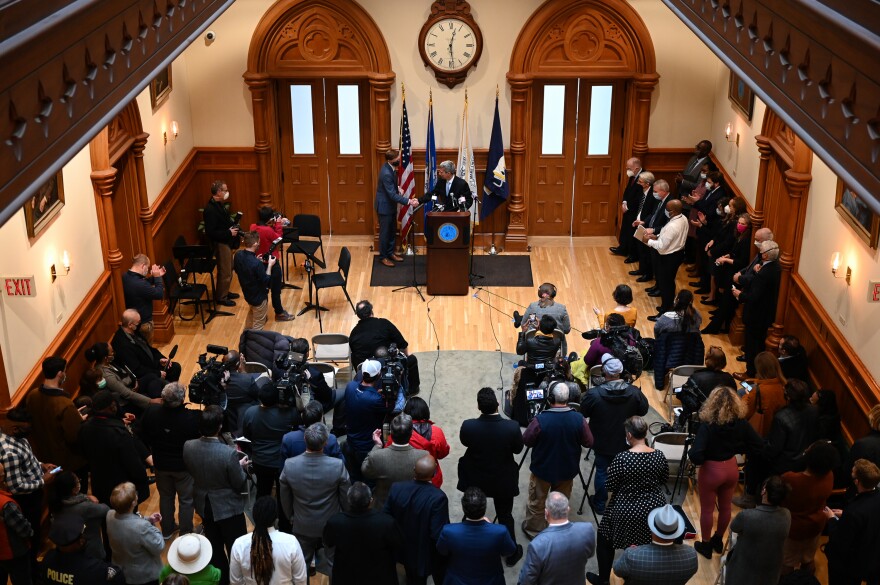Yale announced Wednesday that it plans to nearly double its current yearly payments to the city of New Haven over the next five years. Combined with money the university already promised, Yale will contribute $135 million in lieu of property taxes.
“It’s a historic moment. This is a really big deal,” Mayor Justin Elicker said. The city leader said the proposed amount is more than what Yale paid New Haven in the past two decades.
The agreement comes as cash-strapped cities across the country are recovering from the pandemic and debating whether they should be able to tax nonprofits like universities and hospitals.
Residents of college towns, especially, have called for changes to laws so that municipalities could tax institutions like Yale, which have multibillion-dollar endowments and are traditionally tax-exempt under law because they are considered nonprofit educational institutions.
Yale President Peter Salovey says the first step in the university’s new four-part commitment to New Haven is an extra $52 million over six years. That’s an extra $10 million for five years, and $2 million in the sixth year.
“Yale is extending its lead as the institution that makes the largest annual voluntary contribution of any U.S. university to its home city,” Salovey said of adding $10 million to the university’s existing $13 million annual contribution.

Tyisha Walker-Myers is president of the New Haven Board of Alders, which would vote on greenlighting Yale’s plan. She said she has been talking to neighbors and union members who never thought Yale would step up.
“Those residents finally, finally have an opportunity to see that Yale actually heard what they were saying. This is a great start,” Walker-Myers said. “I’m looking forward to the partnership, and the part of the partnership where we’re having the real conversations about the things that our residents need.”
New Haven is one of the poorest communities in the state when ranked by median income, while the Ivy League school’s endowment grew to $42 billion this year.
Yale’s latest plan is the culmination of two years of negotiations and decades of promises by the university to try to improve relationships with residents. Over the years, the university has established a program for employees to help them buy homes in select New Haven neighborhoods. New Haven Promise, a scholarship program, funds city school students’ college tuition.
Aside from the increased payment in lieu of taxes, the university says its plan includes other steps to make sure New Haven sees equitable opportunity, not just for students, but also for longtime residents of color. Yale’s business school, the Yale School of Management, plans to launch a Center for Inclusive Growth to help New Haven residents. And if Yale buys any land in the next six years, the university has also agreed to pay some property taxes on it.
“Now when Yale grows, we will benefit,” said Elicker.
The university also plans to pay to convert a stretch of High Street near campus into a pedestrian and bike-only space, which will remain open to the public and owned by the city. Yale officials said they have not yet decided whether to open the gated parts of Old Campus to city residents as well.
Henry Fernandez, head of the nonprofit program LEAP, helped negotiate the plan on behalf of the city. He said there are structural problems in the way the state treats city funding and tax policies, and there are structural issues of racial injustice and economic disparity.
“Connecticut cities have historically relied on property taxes to pay their bills. Indeed it’s the only thing that they control, Fernandez said. “This has created a negative town-gown dynamic, basically forever,” he said, adding that state reforms to a so-called tiered PILOT program made it possible for Yale to commit to its funding increase.
Yale said its latest plan is unmatched and it is daring others to follow its lead to help uplift residents of college towns.
“Other universities should see this as the new standard,” Fernandez said.





